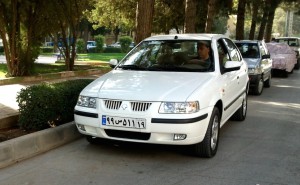
The IKCO Samand is the first "national car" of Iran. At its height, the Iranian auto industry produced 1.6 million vehicles.
The nuclear arms talks between Iran and the United States, which have rattled politicians in Washington D.C., Tel Aviv and Tehran, are also being watch closely inside the auto industry.
“Iran is potentially quite a good market (for vehicles) of over 1 million units annually,” noted Henner Lehne, senior director of global light vehicle forecasting at IHS Automotive. “It’s quite an interesting place to be.”
Some carmakers have been there already, he added. Iran’s indigenous automotive industry was building as many as many as 1.6 million vehicles annually before sanctions slowed the pace of business.
During the years, a long list of European and Asian car companies have done business with Iran’s homegrown carmakers, among them Peugeot, Citroen and Renault of France, Volkswagen, BMW and Mercedes-Benz of Germany as well as Nissan and Toyota of Japan, Proton of Malayasia and Chery of China and Hyundai of South Korea.
(Chrysler pulling out of U.K. For more, Click Here.)
Sanctions against Iran due to its nuclear and other policies have been in place for some time; however, Diplomats from France, Germany, the United Kingdom as well China and Russia have been involved in the recent talks with Iran over a deal that would limit, though not eliminate, according to critics, Iran’s ability to build a nuclear weapon. Iran would also reverse the enrichment of enhanced uranium it has already stockpiled, according to the outline of the tentative deal.
(Click Here for details the new products that could be on Jeep’s horizon.)
Last year, sanctions on Iran were lifted partially, allowing the trade on car parts to expand and shipments jumped.
(To see more Tesla’s plans for self-driving vehicles, Click Here.)
As in Pakistan, a majority of cars in Iran are fueled by compressed natural gas, a fuel that has never had much appeal for North American or European drivers. The controversy over Iran’s nuclear program and its ability to produce a nuclear weapon has completely overshadowed any discussion of trade or economic benefits of trade. Iran also needs substantial investment in its infrastructure for producing crude oil.
The deadline for reaching a new agreement on nuclear arms is supposed to come next, although it could be extended to give the diplomats more time to time to work.
